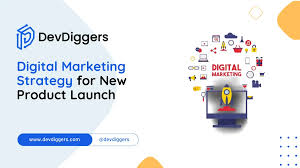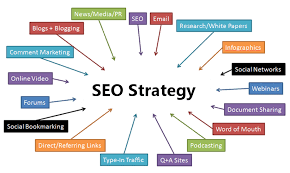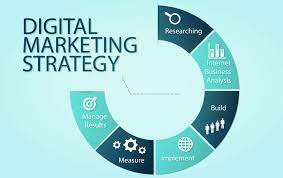Digital Marketing Strategy for Product Launch
Launching a new product is an exciting time for any business, but without a solid digital marketing strategy, your efforts may not reach their full potential. In today’s digital age, leveraging online channels effectively is crucial to create buzz, generate interest, and drive sales for your new product. Here are key components to consider when developing a digital marketing strategy for a product launch:
Define Your Target Audience
Understanding your target audience is essential to tailor your marketing efforts effectively. Identify the demographics, interests, and online behaviours of your ideal customers to create targeted campaigns that resonate with them.
Create Compelling Content
Content is king in the digital world. Develop engaging content that highlights the features and benefits of your new product. Utilise a mix of formats such as videos, blog posts, social media posts, and infographics to capture the attention of your audience.
Utilise Social Media Platforms
Social media platforms offer a powerful way to reach and engage with your target audience. Develop a social media strategy that includes regular posts, sponsored ads, influencer partnerships, and user-generated content to build excitement around your product launch.
Implement Search Engine Optimization (SEO)
Optimising your website and content for search engines is crucial to ensure that potential customers can find information about your new product easily. Conduct keyword research, optimise meta tags, and create high-quality content to improve your search engine rankings.
Leverage Email Marketing
Email marketing remains an effective tool for nurturing leads and converting prospects into customers. Build an email list of interested individuals and send targeted campaigns with exclusive offers, product updates, and personalised recommendations.
Monitor Performance and Adjust Strategy
Track key performance indicators (KPIs) such as website traffic, conversion rates, social media engagement, and email open rates to measure the success of your digital marketing efforts. Analyse data regularly and make adjustments to your strategy based on insights gained from performance metrics.
In conclusion, a well-planned digital marketing strategy can significantly impact the success of a product launch. By understanding your target audience, creating compelling content, utilising social media platforms effectively, implementing SEO best practices, leveraging email marketing campaigns, and monitoring performance metrics closely, you can maximise visibility and drive sales for your new product in the competitive digital landscape.
Essential FAQs on Crafting an Effective Digital Marketing Strategy for Product Launches
- 1. What are the key components of a digital marketing strategy for a product launch?
- 2. How important is defining the target audience when developing a digital marketing strategy for a product launch?
- 3. What role does social media play in promoting a new product during its launch?
- 4. Why is content creation crucial for the success of a digital marketing strategy for a product launch?
- 5. How can search engine optimization (SEO) benefit a product launch campaign?
- 6. What are some effective ways to utilise email marketing in promoting a new product?
- 7. How do you measure the performance of a digital marketing strategy for a product launch?
- 8. What are common pitfalls to avoid when planning and executing a digital marketing strategy for launching a new product?
1. What are the key components of a digital marketing strategy for a product launch?
When considering the key components of a digital marketing strategy for a product launch, it is essential to focus on defining the target audience, creating compelling content, utilising social media platforms effectively, implementing search engine optimisation (SEO) techniques, leveraging email marketing campaigns, and monitoring performance metrics. Understanding the demographics and behaviours of the target audience helps in tailoring campaigns that resonate with them. Compelling content in various formats captures attention and highlights the product’s features. Social media plays a vital role in engaging with potential customers, while SEO ensures visibility online. Email marketing helps nurture leads, and monitoring performance metrics allows for adjustments to maximise success in the competitive digital landscape.
2. How important is defining the target audience when developing a digital marketing strategy for a product launch?
Defining the target audience plays a crucial role in the success of a digital marketing strategy for a product launch. Understanding the demographics, preferences, and behaviours of the target audience allows businesses to create tailored campaigns that resonate with potential customers. By defining the target audience accurately, businesses can deliver personalised content, choose the most effective marketing channels, and maximise engagement. Ultimately, a well-defined target audience ensures that marketing efforts are focused and effective in reaching the right people with the right message at the right time.
3. What role does social media play in promoting a new product during its launch?
Social media plays a pivotal role in promoting a new product during its launch by providing a platform to reach and engage with a wide audience. Through social media channels, businesses can create buzz, generate excitement, and build anticipation for their new product. By leveraging features such as sponsored ads, influencer partnerships, live videos, and user-generated content, companies can effectively showcase the unique features and benefits of the product to potential customers. Social media also allows for real-time interaction with consumers, enabling businesses to address queries, gather feedback, and foster a sense of community around the new product. Overall, social media acts as a powerful tool in driving brand awareness, increasing visibility, and ultimately driving sales during a product launch campaign.
4. Why is content creation crucial for the success of a digital marketing strategy for a product launch?
Content creation is crucial for the success of a digital marketing strategy for a product launch because it serves as the foundation for engaging and informing your target audience. Compelling content showcases the unique features and benefits of your new product, capturing the attention of potential customers and driving interest. By creating high-quality content in various formats such as videos, blog posts, and social media updates, you can effectively communicate your brand message, build credibility, and establish a connection with your audience. Well-crafted content not only educates consumers about your product but also helps to differentiate your brand in a crowded marketplace, ultimately influencing purchasing decisions and contributing to the overall success of your product launch campaign.
5. How can search engine optimization (SEO) benefit a product launch campaign?
Search engine optimization (SEO) plays a crucial role in enhancing the visibility and reach of a product launch campaign. By optimising website content, meta tags, and keywords related to the new product, SEO helps improve search engine rankings, making it easier for potential customers to find information about the product online. Increased visibility on search engine results pages can drive organic traffic to the product website, generate leads, and ultimately boost sales. Additionally, SEO allows businesses to target specific keywords or phrases relevant to the product, attracting qualified leads who are actively searching for similar offerings. Overall, incorporating SEO into a product launch campaign can significantly increase brand awareness and maximise the impact of digital marketing efforts.
6. What are some effective ways to utilise email marketing in promoting a new product?
When it comes to promoting a new product through email marketing, there are several effective strategies to consider. Personalisation is key – segment your email list based on customer preferences and behaviours to deliver targeted and relevant content. Use enticing subject lines and compelling visuals to capture recipients’ attention and encourage them to open the email. Incorporate exclusive offers, product teasers, and engaging storytelling to pique interest and drive conversions. Additionally, leverage automation tools to send timely and personalised messages throughout the customer journey, from initial awareness to post-purchase follow-ups. By combining these tactics, you can maximise the impact of email marketing in promoting your new product effectively.
7. How do you measure the performance of a digital marketing strategy for a product launch?
Measuring the performance of a digital marketing strategy for a product launch is essential to determine its effectiveness and make informed decisions for future campaigns. Key performance indicators (KPIs) such as website traffic, conversion rates, social media engagement, email open rates, and sales figures are commonly used to evaluate the success of the strategy. By analysing these metrics closely, businesses can gain valuable insights into the impact of their digital marketing efforts, identify areas for improvement, and adjust their strategies to optimise results. Tracking performance metrics allows businesses to measure ROI, understand customer behaviour, and refine their approach to achieve their product launch objectives efficiently.
8. What are common pitfalls to avoid when planning and executing a digital marketing strategy for launching a new product?
When planning and executing a digital marketing strategy for launching a new product, it is crucial to be aware of common pitfalls that can hinder success. One common pitfall to avoid is neglecting thorough market research and failing to understand your target audience’s preferences and behaviours. Another pitfall is setting unrealistic goals or expectations without a clear understanding of the competitive landscape. Additionally, overlooking the importance of tracking and analysing data can lead to missed opportunities for optimisation. It is essential to stay flexible, adapt to feedback, and continuously refine your strategy to avoid these pitfalls and maximise the impact of your product launch campaign.



